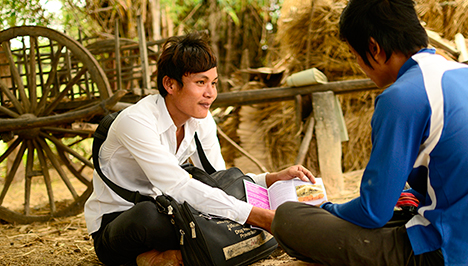-
2025-26 total Australian ODA [budget estimate]
-
$646.6 million
-
2024-25 total Australian ODA [budget estimate]
-
$655.9 million
-
2023-24 total Australian ODA [actual]
-
$689.9 million
Australia's ongoing investments in health help to support a peaceful, stable and prosperous region.
The COVID-19 pandemic has highlighted the vulnerability of many health systems in our region. Our investments respond to the needs of our region, helping to build stronger national systems and also more resilient communities.
How we contribute
Australia supports governments and communities, particularly in the Pacific and Southeast Asia, to build resilient, equitable and inclusive health systems, that can meet current and future health challenges. We are also supporting global efforts to ensure the world is better prepared to prevent and manage future disease outbreaks.
Our assistance for health is guided by Australia's International Development Policy. We are listening to the priorities of our region and supporting local leadership. Our programs support gender-responsive and inclusive health systems that aim to meet the needs of women and girls, people with disabilities and other groups experiencing marginalisation. We seek to incorporate First Nations Australian perspectives in our investments.
We work at national, regional, and global levels. Our investments in health are context-specific and aligned to partner countries' priorities. Australia supports partner countries through providing additional financing, by sharing our skills and networks when requested, and by working with others, such as regional and multilateral organisations and funds.
Our programs support partner countries to provide equitable access to quality, essential health services, grounded in human rights. We work with governments and civil society organisations to:
- bolster national health systems, including strengthening health financing, procurement systems, regulatory mechanisms, and health information systems
- prevent and respond to communicable and non-communicable diseases,
- advance sexual and reproductive health and rights, particularly for women and girls.
We are addressing our shared health challenges – including the risk of pandemics, antimicrobial resistance and the health impacts of climate change.
Australia provides health support in over 20 countries across the Pacific and Southeast Asia, including: PNG, Solomon Islands, Myanmar, Indonesia, Timor-Leste, Cambodia, Fiji, Tonga, Samoa and Vanuatu.
Our flagship regional initiative, Partnerships for a Healthy Region, is providing $620 million over 5 years, working with governments and civil society organisations across our region.
Other Regional programs include: the World Bank Group's ‘Advance UHC Multi-Donor Trust Fund, the Transformative Agenda for Women, Youth and Adolescents, and the Towards Universal Sexual and Reproductive Health and Rights in the Indo-Pacific program.
Through our global programs, Australia partners with key multilateral organisations and global health initiatives including:
- World Health Organization (WHO)
- The Global Fund to Fight Aids, Tuberculosis and Malaria
- Gavi, the Vaccine Alliance
- UNAIDS
- The United Nations Population Fund (UNFPA)
- Global Polio Eradication Initiative (GPEI)
- The Pandemic Fund
- The World Bank Group
- UNICEF
- International Planned Parenthood Federation
These partnerships bring technical assistance and economies of scale in their funding. They enable Australia to extend our reach and impact, and advocate for the needs and perspectives of our region in the global health system.
Investments in improved access to clean water, sanitation, and hygiene (WASH) and nutrition
Inadequate access to WASH services contributes to the spread of disease and lost productivity through illness. We focus on improving access to WASH in households, schools and health centres, including by improving governance and regulatory frameworks and by mobilising private sector investment. Read more about Australia's support for water, sanitation and hygiene. We also invest in better nutrition as this lays the foundation for healthy and productive lives, recognising that the causes of poor nutrition are multiple and complex and require multi-sectoral responses.

